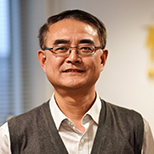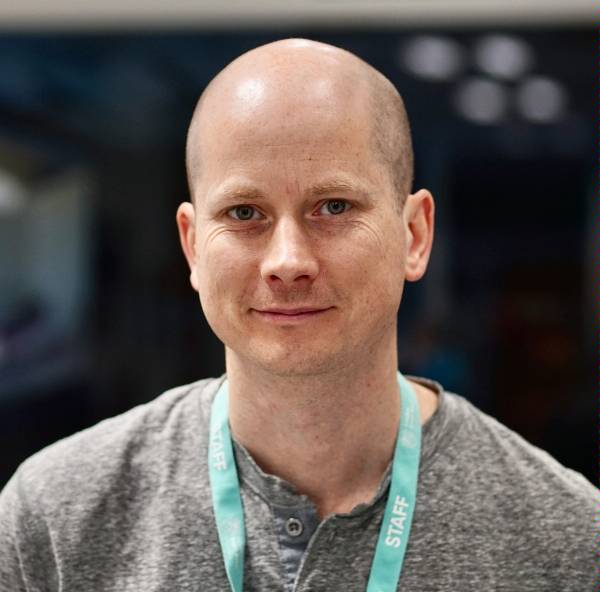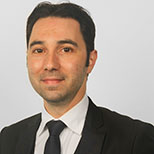Search our site...
Search module
Overview
Tackle complex engineering projects
From power generation and distribution systems to modern processing and manufacturing plants, there’s an array of complex technologies that rely on computer systems developed and designed by electronic and computer engineers. This course will set you on track to be one of those engineers capable of tackling complex engineering projects that are commonplace in our society. Students will explore a wide range of computer hardware and software engineering, electronics, digital systems, embedded systems, computer and network design, artificial intelligence, security, IoT and software development for a variety of fields in today's fast-changing marketplace including modern programming languages and software tools – you’ll cover it all.
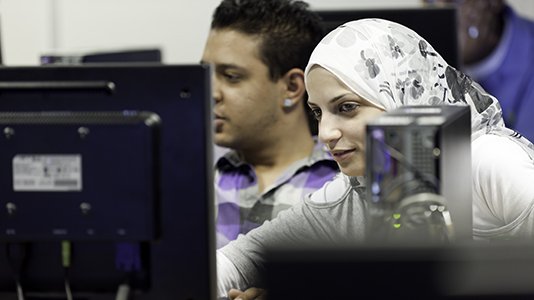
This course is distinctive as it will equip students to exploit the expected exponential growth in highly connected devices and systems. The study develops analytical, computer and applied skills that enhances student’s prospects of employment and consultancy in a wide range of industries, or of running their own business. Students desiring intensive study in electronics and computer engineering will find this course to be a challenging and rewarding experience. After two-years study, the students can opt to having one year industrial placement. The sandwich option, is a significant and distinctive feature of the course, presents an opportunity to understand the way that the industry functions and to gain an appreciation of the priorities in the commercial environment.
The curriculum of this course will enable graduates to obtain the theoretical and practical knowledge to be involved in the design of electronic and computer-based systems to address highly specialized and specific application needs by enhancing their employment opportunities. The best aspect about this course is that its graduates are capable to take technical responsibility for complex engineering systems and are well-prepared for lifelong learning that will enable them to move beyond today’s technology to meet the challenges of the future.
Why Electronic and Computer Systems Engineering at LSBU?
- book reader
- 100% of students on this programme said that the library resources supported their learning well. (National Student Survey 2023).
- brain
- 92% of students on this programme said that teaching staff often make this subject intellectually stimulating. (National Student Survey 2023).
- check-circle
- Multi-disciplinary: Combines the expertise of electrical and electronic engineering, computer science and informatics.
- star
- Our Engineering programmes are ranked 9th in the UK in teaching (National Student Survey 2023).
- laptop
- Sophisticated software: gain experience in using industry-standard equipment, modern computer programming and simulation packages.
- exchange
- Paid work experience: option to complete your third year in a professional work placement and obtain industrial experience.
- puzzle-piece
- Ranked 3rd for Student Satisfaction amongst London competitors for Electrical and Electronic Engineering (Complete University Guide 2021).
- bolt
- This course will go forward for Partial CEng/IEng accreditation by The Institution of Engineering and Technology (IET) in the academic year 2023/24.
- fa fa-users
- From AI machine learning boot camp to silent film processing, there is a range of extracurricular activities for Engineering students to get involved in.
- Formal accreditation can only be granted after an accreditation visit and approval from the IET’s Academic Accreditation Committee.
- The IET accreditation that will take place in the academic year 2023/24 will be backdated to the September 2020 intake.
- Over the last 30 years, all our BEng (Hons) courses have been accredited by the Institution of Engineering and Technology on behalf of the Engineering Council for the purposes of fully meeting the academic requirement for registration as an Incorporated Engineer and partly meeting the academic requirement for registration as a Chartered Engineer.
| ModeFull-time | Duration3 years | Start dateSeptember | Application codeH620 | Application method UCAS |
| ModePart-time | Duration4 years | Start dateSeptember | Application code5605 | Application method Direct to LSBU |
Location
London South Bank University student union is located at 103 Borough Rd, London SE1 0AA.
If you are visiting our Southwark Campus, you may wish to use our downloadable campus map (PNG File 466 KB). For information on accessibility, see our DisabledGo access guides. See our location page for more details.
Entry Level Requirements
To be considered for entry to the first year of this course applicants will be required to have the following qualifications:
Full-time/Part-time students
- A Level BBB including Mathematics and/or Physical Sciences (120 UCAS points) or;
- BTEC National Diploma DDM, including Level 3 Mathematics (128 UCAS points) or;
- EAL Technical Extended Diploma in Engineering Technologies, D, including Further Engineering Mathematics; Electronic and Computer Principles and other options relevant to Electronics and Computer Engineering or;
- Access to HE qualifications with distinctions in 24 credits and merits in 21 credits, with at least 3 distinctions in Mathematics and 3 merits in Physical Science subjects (D24 + M21 totalling to 122 UCAS points) or;
- Equivalent level 3 qualifications worth 120 UCAS points and including Mathematics
- Applicants must hold 5 GCSEs A-C including Maths and English or equivalent (reformed GCSEs grade 4 or above) or;
- We welcome qualifications from around the world. English language qualifications for international students: IELTS score of 6.0 or Cambridge Proficiency or Advanced Grade C, and a Mathematics qualification equivalent to reformed GCSE grade 4 or above, as assessed by UK NARIC
Accredited Prior Learning/Transfer Credit
Applicants may be considered for entry to the second year of the course with the following qualifications. Applicants will normally be interviewed and may be required to sit a Mathematics test to ensure their preparedness for direct entry.
Full-time/Part-time students
- BTEC Higher National Diploma in Electrical and Electronic Engineering or a closely related subject or;
- DipHE in a directly relevant subject or;
- Transfer of 120 Level 4 credits from a directly equivalent degree course and with the approval of the director of that course or;
- An overseas qualification assessed by UK NARIC as equivalent to at least BTEC HND in a closely related subject and an IELTS score of 6.5 or equivalent.
Applicants may be considered for entry to the third year of the part-time course with the following qualifications and will be interviewed to ensure their preparedness for direct entry
Part-time students
- Foundation Degree (FdEng) in a directly-related subject, or;
- Exceptional performance on the part-time HND in Electrical and Electronic Engineering at London South Bank University with the recommendation of its course director
Applicants may be considered for entry to the final year of the full-time course only under the above circumstances and will be interviewed to ensure their preparedness for direct entry.
Full-time students
- Transfer from another IET-accredited course with the approval of the director of that course
Direct entry to the final year of the part-time course is not possible.
Accredited Prior Experiential Learning
APEL may be taken into account in determining the entry requirements for candidates with relevant work experience but cannot replace the requirement for formal qualifications in Mathematics.
Choose your country
Select country here:
Missing English and Maths qualifications?
If you do not have the required English and Maths qualifications needed to satisfy the entry requirements for this programme, we have courses available at our partner College that you can take to upskill in these areas. Find out more at South Bank College.
Advanced entry
If you have already completed some studies at another university, we may be able to consider you for advanced entry. Please see our advanced entry page for more information.
United Kingdom
£9250
Tuition fees for home students
International
£14900
Tuition fees for international students
Tuition fees are subject to annual inflationary increases. Find out more about tuition fees for Undergraduate or Postgraduate courses.
-
Part-time
part-time
BEng (Hons) Electronic and Computer Systems Engineering (PT) - Year 1
UK fee: £6935 International fee: £11175 AOS/LSBU code: 5605 Session code: 1PS00 Total course fee: UK: £27740 International: £44700 BEng (Hons) Electronic and Computer Systems Engineering (PT) - Year 2
UK fee: £6935 International fee: £11175 AOS/LSBU code: 5605 Session code: 2PS00 Total course fee: UK: £27740 International: £44700 BEng (Hons) Electronic and Computer Systems Engineering (PT) - Year 3
UK fee: £6935 International fee: £11175 AOS/LSBU code: 5605 Session code: 3PS00 Total course fee: UK: £27740 International: £44700 BEng (Hons) Electronic and Computer Systems Engineering (PT) - Year 4
UK fee: £6935 International fee: £11175 AOS/LSBU code: 5605 Session code: 4PS00 Total course fee: UK: £27740 International: £44700 -
Full-time
full-time
BEng (Hons) Electronic and Computer Systems Engineering (FT) - Year 1
UK fee: £9250 International fee: £14900 AOS/LSBU code: 5604 Session code: 1FS00 Total course fee: UK (excluding any optional years): £27750 UK (including any optional years): £27750 International (excluding any optional years): £44700 International (including any optional years): £44700 BEng (Hons) Electronic and Computer Systems Engineering (FT) - Year 2
UK fee: £9250 International fee: £14900 AOS/LSBU code: 5604 Session code: 2FS00 Total course fee: UK (excluding any optional years): £27750 UK (including any optional years): £27750 International (excluding any optional years): £44700 International (including any optional years): £44700 BEng (Hons) Electronic and Computer Systems Engineering (FT) - Year 3
UK fee: £0 International fee: £0 AOS/LSBU code: 5604 Session code: 3FS00 Total course fee: UK (excluding any optional years): £27750 UK (including any optional years): £27750 International (excluding any optional years): £44700 International (including any optional years): £44700 BEng (Hons) Electronic and Computer Systems Engineering (FT) - Year 4
UK fee: £9250 International fee: £14900 AOS/LSBU code: 5604 Session code: 4FS00 Total course fee: UK (excluding any optional years): £27750 UK (including any optional years): £27750 International (excluding any optional years): £44700 International (including any optional years): £44700
For more information, including how and when to pay, see our fees and funding section for undergraduate students.
Please check your fee status and whether you are considered a Home, EU or International student for fee-paying purposes and for our regulatory returns, by reading the UKCISA regulations.
See our Tuition Fees Regulations (PDF File 391 KB) and Refund Policy (PDF File 775 KB).
Possible fee changes
The University reserves the right to increase its fees in line with changes to legislation, regulation and any government guidance or decisions.
The fees for international students are reviewed annually and the University reserves the right to increase the tuition fees in line with the RPIX measure of inflation up to 4 per cent.
Scholarships
We offer several types of fee reduction through our scholarships and bursaries. Find the full list and other useful information on our scholarships page.
International students
The course is not currently open to international students.
International (non Home) applicants should follow our international how to apply guide.
Home
| Mode Full-time | Duration 3 years | Start date September | Application code H620 | Application method UCAS |
| Mode Part-time | Duration 4 years | Start date September | Application code 5605 | Application method Direct to LSBU |
Accommodation
Once we have made you an offer, you can apply for accommodation. You can rent from LSBU and you’ll deal directly with the university, not third party providers. That means we can guarantee you options to suit all budgets, with clear tenancy agreements and all-inclusive rents that include insurance for your personal belongings, internet access in each bedroom and on-site laundry facilities.
Or, if you’d rather rent privately, we can give you a list of landlords – just ask our Accommodation Service.
Read more about applying for accommodation at LSBU.
Finance
You don't need to wait for a confirmed place on a course to start applying for student finance. Read how to pay your fees as an undergraduate student.
Prepare to start
Applicant events
After you’ve received your offer we’ll send you emails about events we run to help you prepare for your course.
Enrolment
Before you start your course we’ll send you information on what you’ll need to do before you arrive and during your first few days on campus. You can read about the process on our Enrolment pages.
Reading lists for Year 1 modules
Engineering Mathematics and Modelling
- A Croft and R Davison, (2015) Mathematics for Engineers, A Modern Interactive Approach, 4th Edition, Pearson Prentice Hall.
Electronic Principles
- Lecture Notes
- Physics of Semiconductor Devices, 3rd Edition, Simon M. Sze, Kwok K. Ng. ISBN: 978-0-471-14323-9
Design and Practice
- Kosky P., Balmer R., Keat W., Wise G. (2016). Exploring Engineering: An Introduction to Engineering and Design. Fourth Edition. London: Elsevier.
- Eissen K., Steur R. (2013). Sketching: The Basics. Amsterdam: BIS Publishers.
- Van Emden J. and Becker L. (2017). Palgrave Study Skills: Writing for Engineers. Fourth Edition. New York: Palgrave Macmillan.
- Dogra. S. and Willis J. (2019). Autodesk Fusion 360: A Power Guide for Beginners and Intermediate Users (2nd Edition). CADArtifex
- Banks, K. (ed.) (2016). Social Entrepreneurship and Innovation: International Case Studies and Practice. London: Kogan Page.
- Basu, M and Xavier S. (2016). Fundamentals of Environmental Studies. Delhi: Cambridge University Press.
- Tavris C., and Aronson E., (2015). Mistakes Were Made (But Not By Me): Why We Justify Foolish Beliefs, Bad Decisions and Hurtful Acts. Berwick-upon-Tweed: Pinter and Martin.
- Harford T. (2012). Adapt: Why Success Always Starts with Failure. London: Abacus.
Electrical Circuit Analysis
- Boylestad, R.L., 2013. Introductory Circuit Analysis: Pearson New International Edition. Pearson.
- Floyd, T.L. and Buchla, D., 2009. Electronics fundamentals: circuits, devices & applications. Prentice Hall Press.
- Neil Storey, 2013, Electronics: A systems Approach, 5th Edition, Pearson.
- James W. Nilsson and Susan A. Riedel, 2014, Electric Circuits, Prentice Hall 10th Edition
Object Oriented Programming C++
- Y. Danel Liang, Introduction to Programming with C++, Pearson; 3 edition (25 April 2013)
- Deitel, H., C++ How to Program (4th Edition), Pearson Prentice Hall, 2004.
- Harman & Jones, First Course in C++, McGraw-Hill, 1997.
- Parsons, D., Object Oriented Programming with C++, DP Publications, London, 1994.Edition), Pub EPA Press 3rd ed, 2012.
Digital Logic Design
- Fundamentals of Logic Design: Enhanced Edition | 7th Edition; Charles H. Roth Jr., Larry Kinney and Eugene B. John. Cengage Learning, 2020.
- Digital System Design with SystemVerilog; Mark Zwolinski. Prentice Hall, 2009
This course is distinctive in that it teaches the theory of computer engineering and electronics coupled with the required hardware and software tools, computer simulation, laboratory practice, industrial placement and systems engineering approach to design, that enable graduates to be well equipped with desired skills sought after by employers and further to tackle complex engineering projects that are commonplace in our society. Students in this course will develop strong analytical thinking skills and learn empirical and experimental ways of learning.
The full time program consists of modules with a total credit value of 360 credits which are made up of 16 core modules of 20 points each and a final year project module of 40 points. Each year you need to complete 120 credits. The part-time course mode is delivered across 4 years. The breakdown of credits are: Year 1, 80 credits; Year 2, 100 credits; Year 3, 100 credits; Year 4, 80 credits. The part time course usually involves a full day of teaching per week, requiring attendance at the University on one day per week.
In the first year, the course introduces the science and engineering of computers, programming, electronics and digital systems with emphasis on theory, analysis and design. The second year focusses on core unit operations such as discrete mathematics, algorithms, computer architecture, electronics, networking and software design. The final year includes the individual project, in addition to a wide range of taught modules that allow students to focus on some of the more advanced areas of computing such as embedded systems and The Internet of Things, cybersecurity, Artificial Intelligence, Software Engineering. Your third year placement gives you the chance to further hone your skills by developing of real-world systems in professional environments (sandwich course).
- Engineering mathematics and modelling
This module consolidates the mathematical skills that underpin the BEng engineering degrees. It's specifically designed to cater for the wide differences in mathematical background of 1st year students, as well as to prepare you for the Advanced Engineering Mathematics and Modelling module that you'll take in the second year. Assessment methods: 50% coursework, 50% exam. - Object-oriented programming C++
This module introduces the syntaxes and semantics of programming language C++ and teaches students the intellectual knowledge in programming principles and programming skills with Object Oriented Programming (OOP) techniques. The practical skills include C++ program design with OOP and the use of the compiling tools for editing, compiling, linking and executing programs in workshops. After learning this module, students can pursue other software engineering and advanced programming courses and use OOP techniques to solve simple engineering problems. This module aims to provide students with intermediate proficiency in the use of the C++ programming languages and further to write efficient OOP programs making use of data classes. Assessment methods: 100% coursework. - Electrical circuit analysis
This module is developed to provide students the knowledge of analysing DC and AC electrical circuits. It provides cornerstone skills required in the fields of electrical and electronic engineering, computer systems engineering and mechanical engineering. The course content covers electrical units, measuring instruments, series/parallel DC circuit analysis, storage elements analysis, AC waveforms, R, L, C, RL and RLC AC circuits with phasor analysis, electromagnetism, equivalent circuit of single phase transformer and three phase circuits including Star/Delta winding configurations and analysing the power in the balanced star/delta connected loads with symmetrical three phase supplies. Assessment methods: 50% coursework, 50% exam. - Electronic principles
This module will help you develop your understanding of essential scientific principles for the study of engineering to degree level. It's designed to be accessible to students with a range of prior science specialisation. The module comprises two blocks of study. These will introduce the principles of measurement systems and units, thermal physics and mechanical and electrical principles. Assessment methods: 40% coursework, 60% exam. - Digital logic design
The module covers the fundamental theory for the design of and the practical uses of digital electronics in the two design domains of combinational logic design and sequential logic design. The process of developing digital logic design is modelled using Hardware Description Languages (HDL). The module studies hardware devices to build circuits for digital logic designs and tools to support the design and analysis of those circuits; these include standard logic gates and Field Programmable Gate Arrays (FPGA). The module covers common design blocks such as adders, encoders, comparators, data selectors, flip-flops, counters, registers. The module shows the design and implementation of full digital systems typically based around finite state machines from description in HDL to implementation using FPGA technology. Assessment methods: 50% coursework, 50% exam. - Design and practice
This module will cover material design activities, team work, creative problem-solving, project management, sustainable development principles, personal development planning, report writing communication, Computer-Aided Design (CAD), employability and transferable skills. It's also a work-based module for part-time students, utilising the Virtual Learning Environment (VLE) to provide supporting teaching material and assessments. Assessment method: 100% coursework. - Discrete mathematics, data structures and algorithms
This module introduces the syntaxes and semantics of programming language Java and teaches students the intellectual knowledge in programming principles and programming skills with Object-Oriented Programming (OOP) techniques. It emphasises in Object-oriented problem solving, design, and programming and introduces the data structures and computing algorithms including algorithm design and complexity. Further, this module introduces Discrete Mathematics and structures including concepts of algorithms, induction, recursion, proofs, topics from logic, set theory, combinatorics, graph theory. The practical skills include program design, algorithms and data structures expressed using the Java programming language and further the use of Mathematical Software for Discrete Mathematics. Assessment methods: 50% coursework, 50% exam. - Computer architecture and operating systems
This module consists of two parts. The first part, Computer Architecture, provides the basic engineering foundations of detailed design and implementation of a digital computer system; designs for the CPU, I/O subsystems, and memory organizations; ALU design and computer arithmetic. Bus, memory organization and interrupt structures, control function implementation, pipelining, performance measurement and further Computer Organisation topics. The second part, Operating Systems, is designed to teach students about the role that the operating system has in computing. It also considers the applications in systems such as distributed, multimedia systems and the role that the OS has in supporting the functioning of these. Students will view the operating system from several vantage points. Assessment methods: 40% coursework, 60% exam. - Data communications and computer networks
This module concentrates on teaching students to understand the basics of data communications and networking, and the protocols used in the Internet in particular by using the protocol layering of the Internet and TCP/IP protocol suite. It starts with introducing data communications and defines their components and the types of data exchanged, and then moves on to introduces networks and defines their criteria and structures, discusses different types of networks and finally to discuss the internet’s architecture and protocols as well as other network architectures and wireless communication principles. The module further concentrates on the nature, special problems and current trends towards universal presence of mobile computing. Assessment methods: 40% coursework, 60% exam. - Analogue electronics
This module develops advanced techniques in analogue electronic design covering discrete (BJT / FET) and opamp related circuitry design, simulation, prototyping and testing. The aim of this module is to develop broad knowledge and experience in analogue circuit design from first principles and using SPICE related tools. Assessment methods: 50% coursework, 50% exam. - Embedded software design
This module concentrates on teaching students to understand the basics of embedded systems hardware and software, and to develop the techniques in data acquisition and manipulation required for instrumentation and control applications. Embedded systems hardware and software design for rapid electronic prototyping will be covered. Further, it will solidify lectures with experimental assignment projects based on Arduino microcontroller kits. Specifically, the module will focus on practical interfacing, coding (in C/C++), signal acquisition, processing and display. There will be an independent open-brief project in the last part of the module intended to test the student’s embedded systems design and problem solving skills. Assessment methods: 100% coursework. - Professional practice and team design project
This is a skills-based module developing students' understanding of the design process within engineering, including factors that need to be taken into account in identifying and meeting requirements for new products, i.e. outcomes of processes; working within Regulatory, professional and Standards requirements; developing practical skills; working as part of a team; handling information; project planning and management; and report-writing and presentation skills. Assessment methods: 100% coursework. - Optional placement year
- Computer systems and software engineering
This module covers computer systems from database system to advance computer Architectures. It provides a co-ordinated and consistent coverage of theory, design and development of database systems. Then it focuses to the development of modern computer architectures for servers, workstations, hand-held devices, signal processing and embedded systems. Emphasis is given to design approaches and applications of Data-Level Parallelism in Vector, SIMD, and GPU Architectures. This module also provides students with a theoretical understanding and practical experience in software engineering. The module concentrates on the whole life-cycle of a software product, including: requirement analysis, software architecture and design, implementation, quality assurance, maintenance activities. Assessment methods: 50% coursework, 50% exam. - Cybersecurity and cryptography
This module provides a thorough discussion on cybersecurity and cryptography. It covers thoroughly computer security, network security, information security and mobile security. It discusses critical network security techniques, including the use of firewalls, encryption, intrusion detection, and enterprise-wide security policies. Network security is a major concern when designing and maintaining modern networks, which typically use open protocols and connect to public networks such as the Internet. Cryptographic algorithms in network protocols and network applications as well as the security of computers against intruders (e.g., hackers) and malicious software (e.g., viruses) are examined. Assessment methods: 40% coursework, 60% exam. - Artificial intelligence and signal processing
This module focuses on the signal processing in intelligent systems applications and consists of two parts. The first part, Artificial Intelligence, covers the history and contemporary development of artificial intelligence systems and looks forward to likely near-future developments. It will cover all the major techniques of problem description, knowledge representation and data searching that represent the current toolkit for developing intelligent applications. The second part, Signal Processing, encompass the following: need for and tradeoffs made when sampling and quantizing a signal, linear, time-invariant system properties, frequency as an analysis domain complementary to time, filter design and implementation, control system properties and applications. Assessment methods: 40% coursework, 60% exam. - Embedded systems and the Internet of Things
This module presents the nature and characteristics of embedded systems and the Internet of Things (IoT). It presents techniques for embedded applications, parallel input and output, serial communication, interfacing, interrupt handling, applications involving data acquisition, control, sensors, and actuators, embedded microcontrollers, implementation strategies for complex embedded systems. It is discussed advanced challenges in embedded systems design using contemporary practice; interrupt-driven, reactive, real-time, object-oriented and distributed client/server embedded systems. It is further discussed how IoT connects devices and various systems aiming to understand that it is a network of multiple connected physical objects, the things, involving myriad of applications. Assessment methods: 40% coursework, 60% exam. - BEng project
The individual major project requires students to plan, execute, review and report upon a major piece of technical work directly related to their degree discipline. In this regard, it provides students with the opportunity to develop a high degree of subject specific expertise. This module differentiates from others on the course taken due to the high degree of autonomous study expected. This flexibility should be seen as an opportunity to explore new areas of interest and to acquire new and often unexpected skills. The work undertaken within the project will require students to develop their own methodologies in advance of presenting solutions to the studied problem. Assessment methods: 100% coursework.
Year 1
Year 2
Year 3
Year 4
Careers
Employability Service
At LSBU, we want to set you up for a successful career. During your studies – and for two years after you graduate – you’ll have access to our Employability Service, which includes:
- Free employability workshop and events for student all year round, more details can be found on our event section.
- Online board where you can see a wide range of placements: part-time, full-time or voluntary. You can also drop in to see our Job Shop advisers, who are always available to help you take the next step in your search.
- LSBU Careers Hub offering group workshops on CVs, interview techniques and support, guidance on future careers, as well as loads of career resources, connecting you with employers, exciting events, 1-1 support and relevant workshops.
Our Student Enterprise team can also help you start your own business and develop valuable entrepreneurial skills.
With computers now an essential part of our lives, the demand and opportunities for those who can design computer hardware and develop software applications, manage and service computer systems is only going to continue to grow. Our societies and utilities are driven and controlled by electronic and computer-based systems that could not function without large, professional hardware and software systems - put simply the world cannot function without computers.
Electronic and computer systems engineers work in most industries, including computing and computer programming, automobile, aerospace, telecommunications, networking and network security power production, manufacturing, transport, defence and electronics, embedded systems, health and medicine, research and development, educational sectors. You could design high-tech devices ranging from tiny integrated-circuit chips, to powerful systems that utilise those chips and efficient telecommunication systems.
Likely jobs for graduates include computer network administration under Windows and Unix/Linux, as well as software engineering and design using Java and C++. You could also work independently as a developer, tester or evaluator of any kind of hardware and software application. You'll be able to develop operating systems, compilers, computer games, business applications, computer programs, analyse data and constructing and managing computer systems. In short, you’ll be highly employable in a wide variety of sectors.
LSBU has an enviable reputation for employability and entrepreneurship. Our graduates find opportunities across the world and make an impact wherever they go. The combination of Engineering and LSBU’s focus on high quality teaching and skills development with a vocational drive is key to the success of our graduates. Study with us and doors will open as you embark on the journey that is your career. This course program ensures that graduates have the capacity to meet the needs of employers. This course is producing graduates who are prepared to move into employment with skills and expectations that benefit their employers.
Members of staff in the Division of Electrical and Electronic Engineering (EEE) and in the School of engineering have well-established external links with industry (i.e. IBM, Oracle, Microsoft, Cisco – as an example we run the Cisco Academy) and external research links in collaboration with the existing research centres operating under the School of engineering. We offer research-informed approach to teaching. The School of Engineering has three Research Themes and all academic staff subscribe to at least one of three Research Centres; two research centres are led by EEE members of staff.
An industrial advisory board operates both at school level and division level and feeds into the curriculum design. Membership of the board is drawn from industry, research and distinguished alumni who lend their expertise and advise which shapes our offering.
Placements
The sandwich year alternatives involve a one-year placement away from the School between the second and the third year of academic study and offered only on the full time program. The placement year is not compulsory and is not assessed. However, students who undertake a placement with a relevant company/industry are required to maintain a portfolio and an academic staff member of the division will ensure a visit is taken place to the placement location during the duration of the placement.
Teaching and Assessment
The course is made up of several modules and each module is delivered through a combination of lectures, tutorials, practical workshops, computing workshops, all of which amounts to directed teaching (classroom contact). There is a variance in the makeup of the number of hours dedicated to lectures, workshops, but the total number of study hours attracted by each module is dependent on the module weighting in credits. Typically, a 20-credit module, attracts 200 hours of learning which constitutes both directed learning and independent learning.
Further, teaching and learning in this programme ensures that graduates have the capacity to meet the needs of employers behaving as an agent of change, producing graduates who are prepared to move into employment with skills and expectations that benefit their employers. Graduates must be able to keep abreast with changes, and a key requirement of this programme is equipping students with the mechanisms for achieving this. Lifelong learning is considered in this programme, which can foster such attitudes with novel approaches to teaching and learning that continually question and challenge situations and by highlighting opportunities for advances. Final year modules, including the project, can challenge students by exercises that seek to explore new avenues.
Each module has two main assessment components, usually, the Examination and the Coursework. Each module may have several assessment subcomponents; these may consist of assignments, mini tests, quizzes, essays, laboratory reports, logbooks and examinations of various kinds such as Phase tests. The assessment components for each module are specifically defined and kept up to date in the current Module Guides. To pass a module, students must obtain an overall module mark of no less than 40% and a minimum threshold mark of 30% in each component. The weighting of each component in calculating the overall module mark is given in the Module Guide, and the module leader will often cover the details of this at the beginning of the module.
All students are allocated to a personal tutor – coordinated by the Senior Personal Tutor, as part of Personal Development Plan (PDP). Personal tutoring is embedded in a first year module where students are given the opportunity to learn about the aspects of personal tutoring on their courses. Personal tutoring open surgeries are bookable on demand.
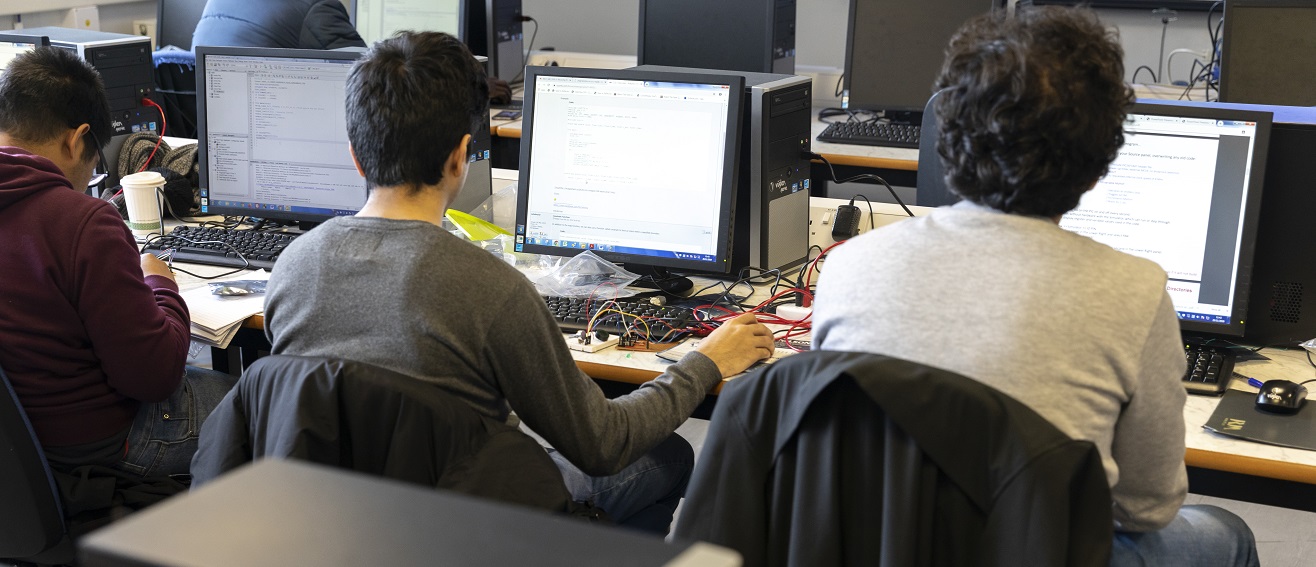

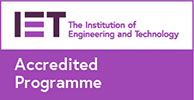
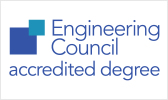
.jpg)
